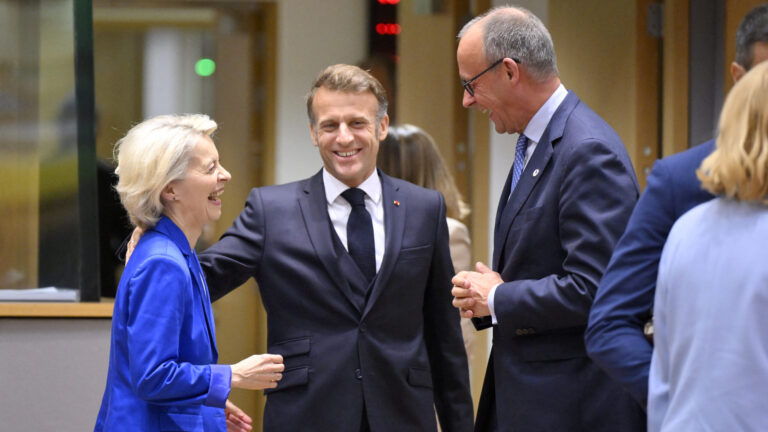This article was published in Vol. 4 No. 3 of our print edition.
The rule of law is a fundamental concept of governance and statecraft, and a universally recognized norm among democracies. It is the result of the evolution of European legal and political thought throughout centuries, and today it seemingly provides the basis for modern governance. Francis Fukuyama even went so far as to argue that the rule of law is among the three most important elements of political development in the history of humankind, alongside the state itself and the prerequisite of accountability. According to him, historically, the principle of the rule of law can be traced back to organized religion, which was able to create a set of rules independent from the state in its legitimacy. For contemporary political science and constitutional law, questions about the state, the rule of law, accountability, and their relationships with each other are still among the most interesting topics.
Thus, great attention has been paid by political theorists, legal scholars, and policymakers to the concept of the rule of law. Nevertheless, it remains an essentially contested concept, which means that there are constant debates about what it entails or should entail, each point of view highlighting different values and aspects. Definitions of the rule of law often include such elements as the equality of citizens before the law, judicial independence, the nonarbitrary exercise of state power, and so on. Still, there is no universally accepted definition or consensus about the content of the rule of law. Today, the only agreement among scholars about the rule of law is that there is a disagreement about what it actually means.
In the last decade, discussions about the rule of law have moved outside of the realm of academia, and it has become part of the political agenda on both sides of the Atlantic. We have witnessed the politicization of the concept: it has become commonplace for the left and the right alike to accuse one another of a lack of respect for the rule of law, portraying political opponents as extremists and enemies of democracy. A few examples will suffice: in the US context, electoral integrity has been one of the most contentious topics of the last few years, as it is seen by many as an important product of the rule of law and a guarantee for democratic governance because the fairness of elections is a fundamental value in any modern democracy. Voter ID laws and regulations, the legal status of mail-in ballots, and ballot harvesting are all seen as important electoral integrity issues, and rightly so. We have all seen what happened with mail-in ballots in 2020, and sadly there has been little improvement in this issue in the past four years. In this context, we can observe both Republicans and Democrats making accusations against each other.
In Europe, the most important development is the adoption of the rule-of-law framework into the EU acquis communautaire in 2014, establishing the rule-of-law procedure as analogous to the infringement procedure.1 Since then, discussions about the rule of law have revolved around judicial independence, civil society, and media freedom, particularly in Hungary and Poland. Coincidentally, these two countries also happened to have elected conservative governments with a vision for Europe that differed sharply from the Brussels mainstream. In contrast to the US context, the politicization of the rule of law has been largely one-sided, with the left being louder and quicker with accusations.
‘We need a rule-of-law conception that does not concede any authority over domestic affairs to supranational organizations and international bureaucracies’
We are far from what could be considered reasonable, and even further from what would be ideal. To arrive at a meaningful solution, we must first understand the problem in its entirety, and the long road we have come to get here. To take a step back to normalcy and try to conceptualize what an ideal concept of the rule of law should look like, we need to specify the issues of our current situation, but it is equally important to investigate the roots of the problems identified.
First, I will try to paint a bigger picture. Globalist elites worldwide, and Eurocrats in particular, all have one thing in common: an aversion to national sovereignty and national identity. Today, we are living in an age that is similar to what Ronald Inglehart described in the late 1970s in his monumental work The Silent Revolution.2 Societies worldwide are experiencing similar deep, structural changes with a significant cultural shift resulting from this phenomenon. In the last decade, we have seen conservative forces gaining ground by appealing to national sovereigntist notions. Their electoral fortunes can be attributed to evoking a sense of community, agency, and self-determination. The Brexit referendum was framed by the UK Conservatives as ‘taking back control’. Donald Trump was elected to the US presidency by using the slogan ‘Make America Great Again’. National identity has become the focal point of political battles worldwide, which is the logical outcome of decades of unrestrained globalism dismantling communities all over the world.
Europe is struggling for an identity. In recent decades, the old continent has ceased to be a role model and innovator. One factor playing into this is the over-expansion of the self-serving EU bureaucracy. Bureaucrats have always had a comfortable home in Brussels, but recently they have expanded their power and reach to previously unseen levels. At the same time—and not independently, of course—we have witnessed the sidelining of national interests to such a degree that the legitimacy of the whole European project is being put into question. The result of all of this is the creation of a background power system that is almost exclusively interested in establishing a federal structure above the member states, irrespective of the will of the European electorates.
How do debates about the rule of law fit into this picture? The answer lies in the properties of the concept of the rule of law and the context of nationalism making a reappearance on the political agenda, as we have seen. What we are really experiencing today is not a crisis of constitutionality and human rights, but a crisis of identity. Debates about the rule of law are, in fact, debates about different value systems.
This is a war that is being fought on the grounds of sovereign nation states versus supranational conceptions of statehood, sovereignty, and democracy. What is really at stake here is nothing less than statehood in Europe itself. The weaponization of the rule of law3 is an important development in the globalists’ crusade against nation states, and the lack of consensus on the definition and substance of the rule of law makes it the perfect weapon for its ill-intentioned wielders. The concept of the rule of law can be conveniently bent to mean whatever liberal values globalists want to promote, and any disagreement with those values invites attack. Accusing EU member states of a ‘rule of law deficit’ is a way to mask disagreements of values in a legalistic manner. It discredits the opponent on the basis of a lack of respect for fundamental norms of governance and it shuts down conversations immediately.
This latter is the most important aspect of the phenomenon: the politically neutral appearance of the rule-of-law debates. Globalists pretend that law and politics are completely unrelated realms, with politics being the game played between good and evil, and law merely being a soulless and lifeless body of texts written without political intent. By maintaining the façade of a legal argument, there is no way to showcase different values and ideas. By now it is easy to see the end goal of this ploy: the point is to make it impossible to draw up a vision for Europe, which could serve as an alternative to the Brussels mainstream. The principle of the rule of law has thus become a partisan tool to whip into line those who think differently about the future of the European community.
Make no mistake, nobody is arguing against the many related concepts and ideas that fundamentally underlie the rule of law, such as the accountability of leaders and governments. These are all important elements of modern democracy that we should cherish and embrace. What we are really doing here is cleaning a purposefully muddied and obscured picture. The message is quite simple: debates about the rule of law cannot be separated from the debates about national identity and national sovereignty.
So how should we approach the concept of the rule of law? With vigilance and willingness to engage in intellectually honest discussions—if there is any room for honest discussion in the current landscape. After clearing up all the facts and misconceptions, we need to return to the original question: what should an ideal conception of the rule of law look like? In my opinion, it should be approached from a sovereigntist perspective. First, the concept of the rule of law needs to return to its original meaning, stripped of all the recently added context and secondary meanings. In order to do so, we need thorough intellectual scrutiny: instead of conflating the rule of law with other esoteric legal concepts, we need to understand it in its own historical context and importance for domestic governance. We should not let holes and leaps in theory be explained by fictitious connections between unrelated concepts.
Next, the misuse and abuse of the term needs to stop. It is not the idea that is wrong—what must be rejected is the deceitful charade put on by globalists to further weaken sovereign nation states. From a sovereigntist standpoint, we need a rule-of-law conception that does not concede any authority over domestic affairs to supranational organizations and international bureaucracies. We need to keep an eye on the bigger picture and understand that these discussions are very much related to the future of the European community. Eurocrats instrumentalize courts to promote their federalist agenda through seemingly neutral rulings about the rule of law. This is why a sovereigntist approach to the rule of law should also include the protection of national courts’ authority. We need a rule-of-law conception that protects national constitutional identity.
The globalists’ agenda involves the weakening of state institutions, to undermine nations’ capacity for self-determination. In my view, the greatest threat to democracy in the West today is posed not by a rise of authoritarianism, but by the increased detachment of globalist elites from reality. They have no sense of community and belonging, thus no ability to understand national issues, and this is why they seek to undermine the national polity. The weaker our national political institutions are the more dependent we become on supranational organizations and global structures. We need to safeguard our national political institutions from any efforts aimed at undermining them.
One last—admittedly rather cynical—question needs to be asked: why is there no rule-of-law procedure against the Commission, or other EU institutions? What if the European Commission acted in a way that threatened the rule of law on the EU level? Surely, the Eurocrats in Brussels would agree to a new kind of protection to safeguard the rule of law. The General Court of the European Union has just ruled against the Commission for a lack of transparency in the vaccine contracts, so nobody can say there is no timely relevance to this question, can they? No, I am not arguing for more useless bureaucratic procedures. I merely wish to point out the inherent contradiction at the heart of this whole ordeal: double standards are applied on a daily basis against those who think differently about the future of Europe, but rules suddenly become important again when liberal values are questioned and globalist political strategies are countered. ‘Rules for thee but not for me’, as the saying goes. Nobody is asking for special treatment, merely for the rules to be implemented and exercised fairly.
NOTES
1 For more details, see Ákos Bence Gát, ‘Perspectives of the European Rule of Law Debate – Is There a Place for Appeasement?’, Közszolgálati Tudásportál (2023), 95–109, https://tudasportal.uni-nke.hu/xmlui/bitstream/handle/20.500.12944/25203/07_gat_en.pdf?sequence=1&isAllowed=y; and Ákos Bence Gát, European Policy on the Rule of Law (KKETTK Alapítvány, 2021).
2 Ronald Inglehart, The Silent Revolution: Changing Values and Political Styles Among Western Publics (Princeton University Press, 1977).
3 For more information about this phenomenon, I recommend reading Frank Füredi and Werner J. Patzelt, Dangerous Game: The Weaponisation of Rule of Law and the Attack on the Veto (MCC Press, 2023).







